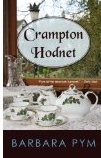“It is rather funny I think,” wrote Barbara Pym in 1939 of her novel-in-progress, Crampton Hodnet.
 11/20/14 “It is rather funny I think,” wrote Barbara Pym in 1939 of her novel-in-progress, Crampton Hodnet. The war prevented her from pursuing publishers, and after the war she felt the book was dated and turned her attention to another of her novels. As a result, Crampton Hodnet wasn’t published until 1985, among the last of her works to appear. Every now and then I re-read one of the thirteen novels of Pym, among my favorite novelists, a master of postwar English humor and ahead of her time in her views of male-female relationships.
11/20/14 “It is rather funny I think,” wrote Barbara Pym in 1939 of her novel-in-progress, Crampton Hodnet. The war prevented her from pursuing publishers, and after the war she felt the book was dated and turned her attention to another of her novels. As a result, Crampton Hodnet wasn’t published until 1985, among the last of her works to appear. Every now and then I re-read one of the thirteen novels of Pym, among my favorite novelists, a master of postwar English humor and ahead of her time in her views of male-female relationships.
Pym grew up in the Church of England, worked much of her life for a scholarly anthropological society, and never married. Her books often feature curates and vicars and academicians and single women. Crampton Hodnet provides a taste of the humor in all of the novels she wrote after it.
Mr. Latimer, below, is a curate.
I labelled the quotations and present them in the order in which they occur in the book. If you’ve never read Pym, I invite you to sample her. If you know her, enjoy the revisit.
Academic communities: “Are there no sick people I ought to visit?” asked Mr. Latimer hopefully.
“There are no sick people in North Oxford. They are either dead or alive. It’s sometimes hard to tell the difference, that’s all,” explained Miss Morrow.
Men: “But it sounds so silly. It makes me out to be such a feeble, inefficient sort of creature,” said Mr. Latimer, protesting.
“Well, men are feeble, inefficient sorts of creatures,” said Miss Morrow calmly…
Husbands and wives: “…Oh, I’ve been doing some work,” [Mr. Cleveland] said vaguely. “I don’t know how you can sit about all afternoon doing nothing.”
“Well, dear, you can come and mend your own socks, as you seem to think it less arduous than what you’ve been doing,” said Mrs. Cleveland placidly.
Professors; His pupils had been helping him with his book for the past twenty years; it was really quite a wonder that it had not been finished before now.
Librarians: He was glad he was wearing his shoes with crepe rubber soles. He had found them very useful in the Bodleian and had been able to approach people and hear many interesting conversations without being seen or heard himself.
Librarians: “It’s really the fault of the Bodley’s librarian,” declared Mrs. Wardell surprisingly. “There he is in the library, with a lot of idle assistants who have nothing to do but gossip.”
Libraries: Everyone knew that libraries had an unnatural atmosphere that made people behave oddly.
Mothers: Of course Mother was his whole life and he would be quite lost without her, but he sometimes wondered if it might not be rather pleasant to be quite lost.
The male’s polygamous nature: “…What could be more natural than for him to have a little affair of the heart? Man is by nature polygamous…”
Marriage: Somehow, she felt that she did not admire Mr. Latimer quite as much as other people did. Perhaps it was because she knew him too well. After all, he had nearly been her husband, and that surely presumed a degree of acquaintance which did not allow of excessive and unquestioning admiration. For, although she was in many ways a romantic, Miss Morrow could not help thinking that one married people in spite of faults rather than because of virtues.
Invitations: “Of course you must come,” said Miss Doggett sharply. “Your being there will make no difference one way or the other.”
Miss Morrow walked meekly along by Miss Doggett’s side, a comforting neutral thing, without form or sex. There was something so restful in being somebody whose presence made no difference one way or the other.
Husbands and wives: If only Margaret had been a little more reasonable, all this would never have happened. It hardly occurred to him how lucky he was to have a wife who, besides being a wife, could also be held responsible for everything that had happened to him!
Above quotatons from Crampton Hodnet, Barbara Pym, E.P. Dutton, New York, 1985.
Gary Garth McCann
First-prize winner for short works and for suspense/mystery, Maryland Writers’ Association, Gary Garth McCann is the author of the novella Young and in Love? and of the novels The Shape of the Earth and The Man Who Asked To Be Killed, praised at the Washington Independent Review of Books. His most recent published stories are available online in Chelsea Station Magazine, Erotic Review Magazine, and in Mobius: The Journal of Social Change. His other stories appear in The Q Review, reprinted in Off the Rocks, in Best Gay Love Stories 2005, and in the Harrington Gay Men’s Fiction Quarterly. See his blogs at garygarthmccann.com and streamlinermemories.com.
- Web |
- More Posts(57)